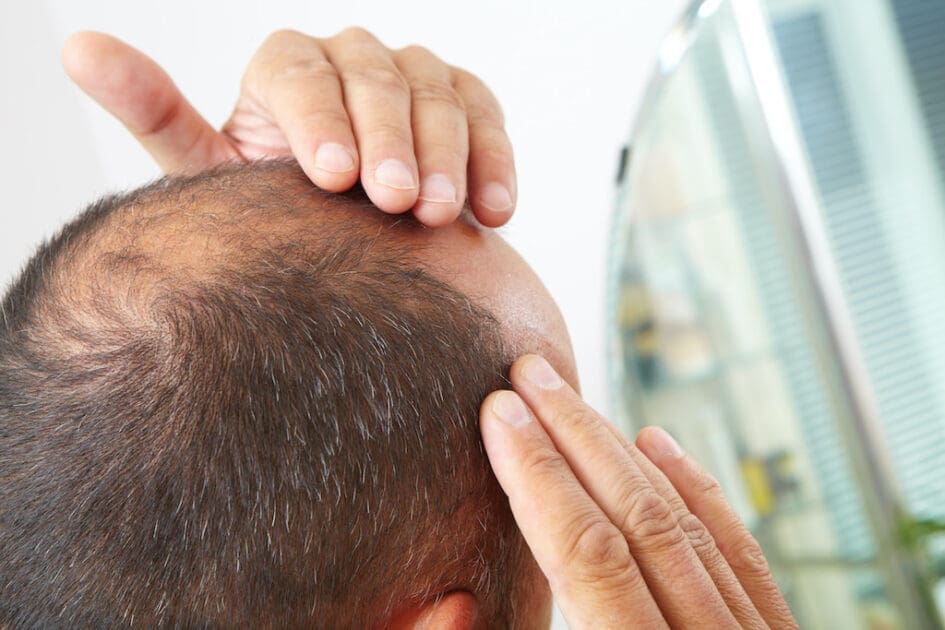Is hair loss a symptom of COVID-19?

COVID-19 causes a wide array of long-term physical symptoms, as the past year has shown us. Among these symptoms are aches and pains, difficulty breathing, and a loss of smell and taste. However, other symptoms of the virus are less commonly discussed, such as its potential to cause hair loss in patients. Learn more about symptoms of hair loss in COVID-19 patients, along with possible solutions, like micropigmentation.
What kind of hair loss are we referring to?
Doctors began noticing a significant increase in hair loss among patients around the onset of the worldwide pandemic. Because hair loss was reported among COVID-19 patients and healthy individuals, it has been classified as telogen effluvium. While this term may sound fancy, it is essentially used to denote temporary hair loss that occurs when the body is under stress. Telogen effluvium is common during or immediately following pregnancy or illness. Certain prescription medications can also trigger it.
Who is affected?
The onset of telogen effluvium can be caused by a variety of factors, like illness or chronic stress. Living in the midst of a pandemic is indeed stressful, which is why doctors have noted such a large increase in patient hair loss during these trying times. Therefore, pandemic-related hair loss is not just limited to those who have contracted COVID-19. Anyone prone to stress is at risk.
When will I notice hair loss?
It’s important to remember that hair loss caused by illness generally takes a few months to set in. So, if COVID-19 is the primary cause of your alopecia, you might not notice signs right away. This means it might be difficult at first to identify the disease as the cause of hair loss.
Another factor to keep in mind is your current hair density. Those with a lot of hair on their head are unlikely to notice signs of hair loss immediately. On the other hand, someone already undergoing male pattern baldness will probably notice additional hair loss sooner rather than later.
So, how does COVID-19 interrupt my hair growth?
If you have identified COVID-19 as the source of your hair loss, it’s most likely telogen effluvium. This means the hair loss is temporary. But how does COVID-19 manage to disrupt your hair growth so efficiently?
It turns out that many of the stressful triggers of telogen effluvium are also present in several illnesses, like COVID-19. These triggers include severe physical or emotional distress, weight loss of more than 20 pounds, and high fevers. Because all of these risk factors are common symptoms of the virus, it makes sense that COVID-19 would induce hair loss in patients.
On a more technical level, you have to understand a hair follicle’s life cycle. There are three stages in this cycle: growing (anagen), resting (telogen), and shedding (exogen). Normally, this cycle repeats uninterrupted. However, when a powerful stressor is introduced, up to half of the hairs may enter the shedding phase prematurely. When your body enters survival mode, it shifts its priorities and energy flow – keeping your hair shiny and smooth is not a main focus.
Where does hair loss occur?
Most hair loss of this kind is centered on the scalp and may be concentrated around the temple area. However, unlike male pattern baldness, the shedding usually occurs all over the head. Little to no hair loss is experienced in other areas of the body, such as the eyebrows or legs. Patients may notice hair loss while showering or brushing their hair, and loss may range from mild to severe.
How is hair loss treated?
In order to achieve the best results, it’s good practice to focus on identifying the root cause of the problem. In the case of stress-induced hair loss, this means a variety of things. First, an analysis of nutritional intake may be beneficial in order to maintain a more well-balanced diet. In addition, regular exercise and a sufficient amount of sleep are important in helping manage stress. Vitamins and gentle hair care products can also prove useful. Rogaine may be beneficial until your hair has regrown. A trained medical professional will be able to provide you with more guidance on this front.
Micropigmentation and Other Solutions
If the above techniques fail to yield results, you may be exploring alternative solutions. While telogen effluvium is temporary, it may take several months for your hair to regrow. If you already suffer from male pattern baldness, the added long-term stress of a global pandemic may accelerate your hair loss.
In addition to practicing good stress management techniques and caring for your body, in these cases you may benefit from treatment like scalp micropigmentation. At Scalp Micro USA, we offer natural-looking, non-invasive micropigmentation solutions performed by skilled practitioners. Contact us today to learn how we can help transform your hairline with micropigmentation!

Tired of hair loss?
Get the perfect hairline, 100% guaranteed, with our scalp
micropigmentation treatment that is customized just for you. No more
crazy combovers. No more ineffective medications. Just results.